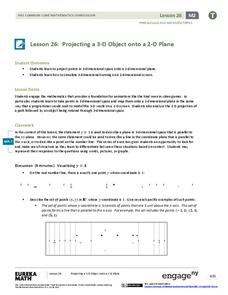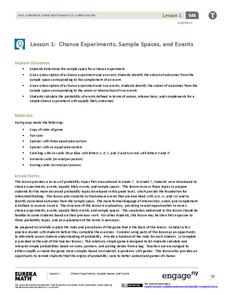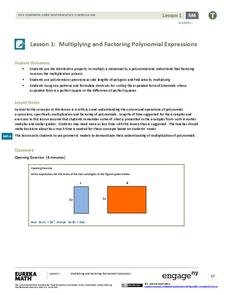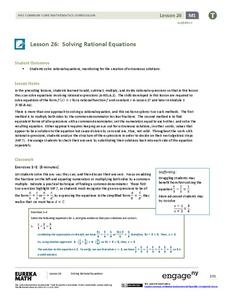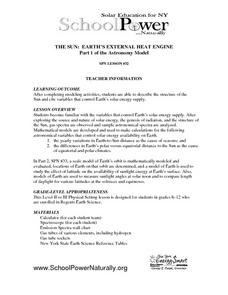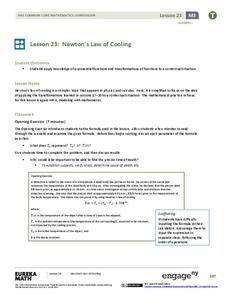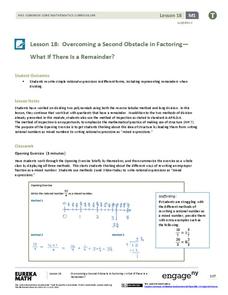EngageNY
Advanced Factoring Strategies for Quadratic Expressions (part 1)
Factoring doesn't have to be intimidating. Build on prior knowledge of multiplying binomials and factoring simple trinomials to teach advanced factoring of quadratic expressions with a lesson that uses various methods of exploring the...
Curated OER
Symmetry of the Addition Table
Help your class discover the commutative property of addition with this exploration of the addition table. By folding and coloring the table, a symmetry is found that directs students to an understanding of this crucial mathematical...
EngageNY
Projecting a 3-D Object onto a 2-D Plane
Teach how graphic designers can use mathematics to represent three-dimensional movement on a two-dimensional television surface. Pupils use matrices, vectors, and transformations to model rotational movement. Their exploration involves...
EngageNY
Motion Along a Line – Search Robots Again
We can mathematically model the path of a robot. Learners use parametric equations to find the location of a robot at a given time. They compare the paths of multiple robots looking for parallel and perpendicular relationships and...
Curated OER
Pay Check Advance Loan
Students research loans. In this financial lesson, students explore the benefits and drawbacks of applying for a pay-day advance loan. Students compare different programs and calculate interest owed. Multiple resources are provided.
Mathematics Vision Project
Module 1: Functions and Their Inverses
Undo a function to create a new one. The inverse of a function does just that. An inquiry-based lesson examines the result of reversing the variables of a function, beginning with linear patterns and advancing to quadratic and...
EngageNY
Advanced Factoring Strategies for Quadratic Expressions (part 2)
What do you do with a difficult-to-factor quadratic expression? This lesson provides the answer. Pupils learn a grouping strategy to help factor trinomials. When guess and check seems too tedious, this method is the "works every...
101 Questions
25 Billion Apps
Learn to use mathematics to your advantage! Using linear modeling, scholars predict the date and time the Apple App Store reaches 25 billion downloads. Considering the prize for the 25 billionth download was a $10,000 gift card, modeling...
Math Stars
Math Stars: A Problem-Solving Newsletter Grade 6
Think, question, brainstorm, and make your way through a newsletter full of puzzles and word problems. The resource includes 10 different newsletters, all with interesting problems, to give class members an out-of-the box...
EngageNY
Using Expected Values to Compare Strategies
Discover how mathematics can be useful in comparing strategies. Scholars develop probability distributions for situations and calculate expected value. They use their results to identify the best strategy for the situation.
EngageNY
Chance Experiments, Sample Spaces, and Events
Want a leg up on the competition? Show classes how to use mathematics to their advantage when playing games. Learners calculate probabilities to determine a reasonable scoring strategy for a game.
EngageNY
Multiplying and Factoring Polynomial Expressions (part 1)
Polynomial multiplication and factoring go hand in hand. Why not teach them together. This resource begins with an area model for distributing a monomial and then connects the process to factoring the GCF. Learners then advance to...
EngageNY
Solving Rational Equations
What do fractions and rational expressions have in common? Everything! Learners use common denominators to solve rational equations. Problems advance from simple to more complex, allowing pupils to fully understand the material before...
Curated OER
Mathemafish Population
It's shark week! In this problem, young mathematically minded marine biologists need to study the fish population by analyzing data over time. The emphasis is on understanding the average rate of change of the population and drawing...
Curated OER
Numbers as Descriptors
Pupils use numbers as descriptors. In this mathematical inquiry lesson, students use numbers to describe, classify, and compare plants. Pupils are made aware that numbers can be used to describe things in the world around them.
Resources for Early Childhood
Making Math Meaningful and Enjoyable
Your young learners will enjoy mathematics that is meaningful correspondence as they play their way to a deep mathematical foundation. Organized around the math standards, this appropriate sequence of conceptual, preschool...
Shodor Education Foundation
Pythagorean Theorem
Most adults remember learning about the Pythagorean theorem, but they don't all remember how to use it. The emphasis here is on developing an intuitive understanding of how and when to use the theorem. Young mathematicians explore...
Noyce Foundation
Piece it Together
Score some problems all related to soccer balls. The first few problems focus on pattern blocks to see relationships between figures. More advanced problems focus on actual soccer balls, the patterns on the balls, and their volumes and...
Curated OER
The Sun: Earth's External Heat Engine - Part 1 of the Astronomy Model
Designed by School Power...NaturallySM, this lesson familiarizes advanced earth science and physics learners about the variables that affect our supply of solar energy. They examine gas spectra and perform calculations. There is an...
Balanced Assessment
Egyptian Statue
Investigate the proportional relationships of length, area, and volume. Learners use the dimensions of rectangular prisms to create ratios and proportions. They compare the different ratios to solve more advanced problems.
Concord Consortium
Adding the Sines
It's a sign! Scholars analyze sine functions for patterns in their periods. The exploration advances beyond a simple function to the combination of two functions with even and odd coefficients. Their goal is to find a pattern between the...
Curated OER
Discovering Math Concepts in Advanced Algebra
Students explore the concept of Chinese contributions in mathematics. In this Chinese contributions in mathematics activity, students research Chinese achievements in mathematics. Students solve 3x3 systems of equations using the...
EngageNY
Newton’s Law of Cooling
As part of an investigation of transformations of exponential functions, class members use Newton's Law of Cooling as an exponential model to determine temperature based on varying aspects. The resource makes comparisons between...
EngageNY
Overcoming a Second Obstacle in Factoring—What If There Is a Remainder?
Looking for an alternative approach to long division? Show your classes how to use factoring in place of long division. Increase their fluency with factoring at the same time!


